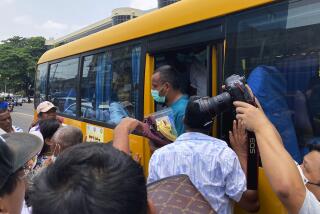Martial Law in Taiwan to End Tonight : Security Rules Will Replace 38-Year-Old Practice, Chiang Says
TAIPEI, Taiwan — President Chiang Ching Kuo today decreed the end of martial law imposed by his Nationalist Party 38 years ago when it fled to this island after the communists took over mainland China.
The official Central News Agency quoted Chiang as saying in a decree that martial law will be replaced at midnight by new security measures approved by the Legislative Yuan, Taiwan’s highest lawmaking body.
“We are looking at the government’s next move cautiously,” dissident leader Kang Ning Hsiang told a reporter. “The political environment is still largely unclear.”
Martial law was imposed in 1949 when the Nationalist government and about 2 million supporters fled to Taiwan after losing a civil war to the communists on the mainland. Martial law has been a mainstay of the Nationalists’ authoritarian rule.
Announcement Last October
Chiang first announced last October that he would lift martial law, which barred the formation of new political parties and allowed civilians to be tried by military courts on sedition and other charges.
Enforcement of martial law has not been strict in recent years. In September, dissidents formed the Democratic Progressive Party, which received 21.6% of the vote in December legislative elections.
Under the new security measures passed by the Yuan last month, new political parties are permitted, but they must be anti-communist and back the unification of Taiwan and China. The provision is aimed at discouraging the independence movement supported by many native Taiwanese, who comprise 85% of the island’s 19.5 million people.
Plebiscite Proposed
Both the Nationalists and communists maintain they are the sole legitimate government of China. The Democratic Progressive Party has proposed a plebiscite to let Taiwanese determine their future.
Many scholars believe the Nationalist Party’s decision to lift martial law came about because of pressure of the increasingly vocal dissident movement, which has staged several street demonstrations recently to press demands for democracy.
Observers also believe the government move was aimed at improving the country’s image overseas, particularly in the United States, which is Taiwan’s main arms supplier and trading partner.
Chiang, 77, son of the late Nationalist leader Chiang Kai Shek, has been promoting reform to solidify public support for the Nationalist Party before he steps down, ending six decades of family rule.
More to Read
Sign up for Essential California
The most important California stories and recommendations in your inbox every morning.
You may occasionally receive promotional content from the Los Angeles Times.










